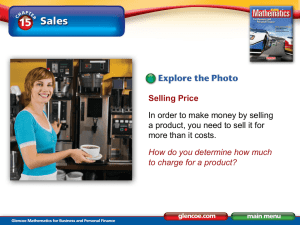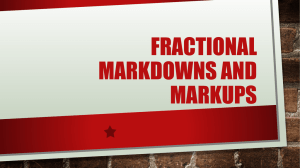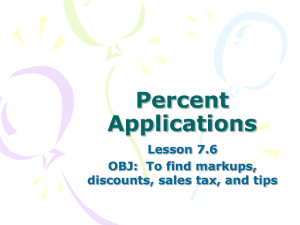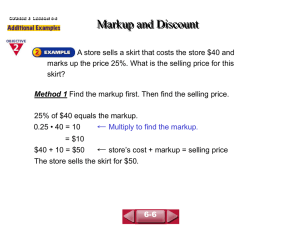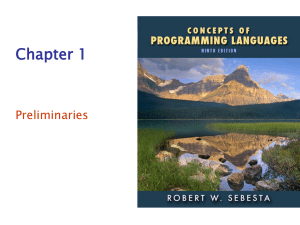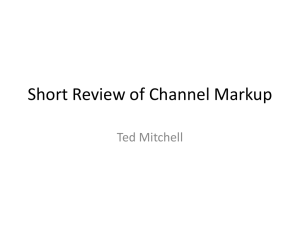Markup = Retail Price
advertisement
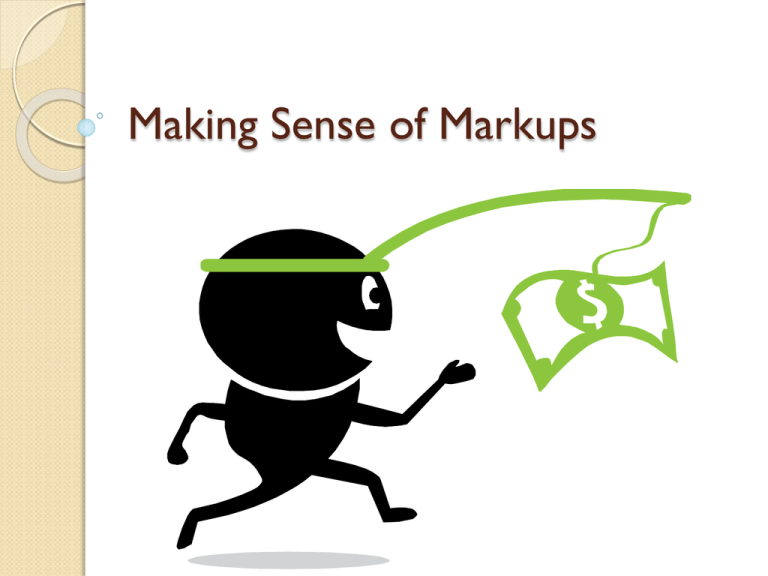
Making Sense of Markups Pricing Products Does a retailer make the products it sells? ◦ Not Usually –buy from wholesalers/producers Does a Retailer buy a shirt for $15 and sell it to customers for $15? ◦ Why or Why not? If a retailer does not sell its products for more than what it cost them, what would happen? Rounding in Marketing Round money to the nearest 100th ◦ $435.34555 ◦ $435.35 Round Percentages to nearest tenth ◦ 97.567% ◦ 97.6% Pricing Products To make a profit, what must a business do with the products they buy to sell? ◦ Mark them up What is Mark-up Cost: the initial price paid by retailers/manufacturers for the products they sell ◦ Includes shipping costs Markup: adding a dollar amount (markup), as a percentage or a dollar amount, to the cost of the products purchased to sell to customers ◦ Used by retailers and wholesalers primarily Retail Price: The total price charged for a product sold to a customer, which includes the manufacturer's cost plus a retail markup. Convert % to a Decimal • Process: Drop the % symbol and move the decimal point 2 places to the left Example: Convert 75% to a decimal: Example: Convert 8.5% to decimal Answer 8.5% = 0.085 Example: convert 180% Answer 180% = 1.80 How to Markup Most difficult thing to determine in business is how to price your product Should every product a business sells be “marked-up” the same percentage?” ◦ No, every item is different and is based on: Customer Demand for a product What competitors are pricing their products for Calculating Markup Amount Formula: Markup = Retail Price – Cost ◦ Difference between retail price and cost ◦ The markup may also be called the gross profit or profit margin Example Discount Electronics purchased HDTVs for $489.56 each and sells them for $899.99 What is the markup amount on each TV? Markup = Retail Price – Cost Mark up = 899.99 – 489.56 = 410.43 Calculate Retail Price w/Markup Rate First calculate the markup amount Then add the markup amount to the cost to equal your Retail Price Two Step Formula: Markup = Cost * Markup Rate Retail Price = Cost + Markup Example Wholesale Jewelers, Inc. sells digital watches to jewelry stores for $18.45 each. The suggested retail price is to add a mark-up rate of 160% of cost. What is the suggested retail price? 29.52 Markup = * = Retail Price = = 47.97 + Formula: Markup = Cost * Markup Rate Retail Price = Cost + Markup Let’s Practice What is 170% of $125 cost ◦ Markup ◦ Retail Price: 104% of $4329 cost is what? ◦ Markup: ◦ Retail Price: Calculate Additional Quantity You want to purchase more product than last year. Formula: ◦ Additional Quantity = Original order * converted % ◦ Total Order = Additional Quantity + Original order Example: You bought 95 hats last year and want to increase your order by 50% more this year. 95 X .50 = 47.50 47.50 + 95 = 142.50 round up/down ◦ How many are you buying? 143 items Example If our school store purchased 144 mittens last year, and this year we would like to purchase 30% more than last year. How many mittens do we need to order this year? 144 * .30 = 43.2 144 + 43 = 187 mittens Markup as a Rate (Percentage) The markup rate is the markup expressed as a percent Businesses usually express the markup in one of two ways: ◦ As a percent of the Retail price ◦ As a percent of Cost Markup as a Percent of Retail Price Businesses usually express the markup as a percent of the retail price (selling price) Formula: Markup rate = Markup / Retail Price Example: Luggage costs $54 and you want to sell it for $90, what is the markup rate based on retail price? ◦ Markup Amount = Retail Price – Cost $90-$54 = $36 markup ◦ Markup rate = Markup / Retail Price 36/90 = .40 or 40% markup Rate Markup as a Percent of Retail Price A Florist buys roses for $10.99 a dozen and sells them for $24.95 a dozen. What is the markup rate based on the retail or selling price? Markup = Retail Price – Cost Markup Amount = 24.95-10.99 = 13.96 Markup rate = Markup / Retail Price Markup rate = 13.96/24.95 ◦ Markup rate = .5596 ◦ Markup rate = 56% Markup as a Percent of Retail Price Our school store purchases a printed Under Armour hooded sweatshirt from Gear for Sports for $37.50. We sell the hooded sweatshirt for $60.00. What is the markup rate based on retail price? Markup rate = Markup / Retail Price $60.00 – $37.50 = $22.50 markup ◦ $22.50 / $60.00 = .375 = 37.5% Markup as a Percent of Cost Many businesses use the cost to figure the markup rate Formula: Markup rate = Markup / Cost Example: Rain suit cost $120 and you want to sell it for $162. What is the markup based on cost? ◦ First calculate markup: $162- $120 = 42 ◦ Next calculate markup rate: 42/120 = 35% Practice Gear for Sports sells under armour t-shirts to the school store for $13.50 each. They have a suggested retail price computed by marking up the cost by 60%. What is the suggested retail price? Markup = Cost * Markup Rate ◦ 13.50 * .60 = 8.10 Selling Price = Cost + Markup ◦ Selling Price = 13.50 + 8.10 = $21.60 Post Test
